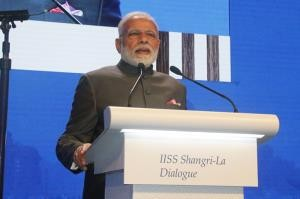Friends,
The Indo-Pacific is a natural region. It is also home to a vast array of global opportunities and challenges. I am increasingly convinced with each passing day that the destinies of those of us who live in the region are linked. Today, we are being called to rise above divisions and competition to work together.
The ten countries of South East Asia connect the two great oceans in both the geographical and civilizational sense. Inclusiveness, openness and ASEAN centrality and unity, therefore, lie at the heart of the new Indo-Pacific. India does not see the Indo-Pacific Region as a strategy or as a club of limited members.
Nor as a grouping that seeks to dominate. And by no means do we consider it as directed against any country. A geographical definition, as such, cannot be. India's vision for the Indo-Pacific Region is, therefore, a positive one. And, it has many elements.
One,
It stands for a free, open, inclusive region, which embraces us all in a common pursuit of progress and prosperity. It includes all nations in this geography as also others beyond who have a stake in it.
Two,
Southeast Asia is at its centre. And, ASEAN has been and will be central to its future. That is the vision that will always guide India, as we seek to cooperate for an architecture for peace and security in this region.
Three,
We believe that our common prosperity and security require us to evolve, through dialogue, a common rules-based order for the region. And, it must equally apply to all individually as well as to the global commons. Such an order must believe in sovereignty and territorial integrity, as well as equality of all nations, irrespective of size and strength. These rules and norms should be based on the consent of all, not on the power of the few. This must be based on faith in dialogue, and not dependence on force. It also means that when nations make international commitments, they must uphold them. This is the foundation of India's faith in multilateralism and regionalism; and, of our principled commitment to rule of law.
Four,
We should all have equal access as a right under international law to the use of common spaces on sea and in the air that would require freedom of navigation, unimpeded commerce and peaceful settlement of disputes in accordance with international law. When we all agree to live by that code, our sea lanes will be pathways to prosperity and corridors of peace. We will also be able to come together to prevent maritime crimes, preserve marine ecology, protect against disasters and prosper from blue economy.
|

